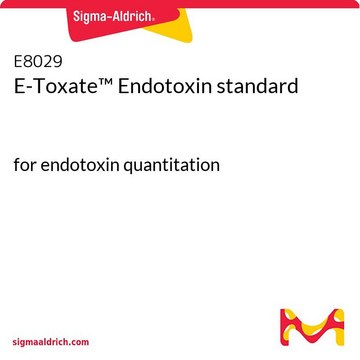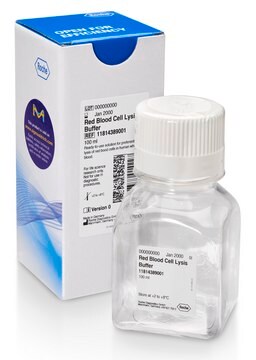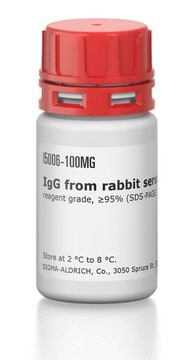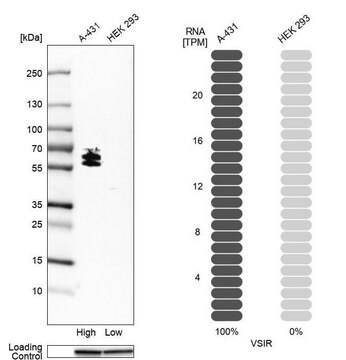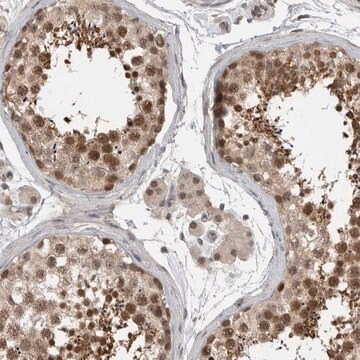E8279
Endostatin murine
recombinant, expressed in Pichia pastoris, ≥95% (SDS-PAGE)
Sign Into View Organizational & Contract Pricing
All Photos(1)
About This Item
MDL number:
UNSPSC Code:
12352200
Recommended Products
recombinant
expressed in Pichia pastoris
Assay
≥95% (SDS-PAGE)
impurities
endotoxin, tested
UniProt accession no.
shipped in
dry ice
storage temp.
−70°C
Gene Information
mouse ... Col18a1(12822)
General description
Endostatin was originally isolated from the conditioned media of EOMA, a murine hemangioendothelioma non-metastatic cell line. It is a derivative of collagen XVIII, and is the C-terminal 20kDa peptide of the same. Collagen XVIII is a proteoglycan present in the basement membrane and vascular walls. Proteases such as, cathepsin L and matrix metalloproteases, cleave the C-terminal domain containing protease sensitive region. It has a partly arginine-rich globular fold, which acts as the heparin-binding epitope.
Biochem/physiol Actions
Endostatin is a potent inhibitor of angiogenesis and tumor growth in vitro and in vivo; specifcally inhibits endothelial cell proliferation.
Endostatin is a potent inhibitor of angiogenesis and tumor growth in vitro and in vivo; specifcally inhibits endothelial cell proliferation. Recombinant Endosatin expressed in yeast causes G1 arrest of endothelial cells, and endostatin treatment results in apoptosis of HUVE and HMVE cells.
Endostatin is an endogenous inhibitor of angiogenesis, and in vitro inhibits the migration of endothelial cells. Collagen XVIII is cleaved to form endostatin, and this system might act as the negative control of angiogenesis. During wound healing, endostatin decreases the amount of blood vessels that function normally, along with the matrix density in granulation tissue. However, it does not have an overall impact on wound healing. As it is a potent inhibitor of angiogenesis, it also strongly suppresses tumor growth.
Physical form
17 mM citric-phosphate buffer, pH 6.2.
Legal Information
US Patent 5,854,205. Sold under license from CMCC.
Storage Class Code
12 - Non Combustible Liquids
WGK
WGK 2
Flash Point(F)
Not applicable
Flash Point(C)
Not applicable
Personal Protective Equipment
dust mask type N95 (US), Eyeshields, Gloves
Choose from one of the most recent versions:
Already Own This Product?
Find documentation for the products that you have recently purchased in the Document Library.
M S O'Reilly et al.
Cell, 88(2), 277-285 (1997-01-24)
We previously identified the angiogenesis inhibitor angiostatin. Using a similar strategy, we have identified endostatin, an angiogenesis inhibitor produced by hemangioendothelioma. Endostatin is a 20 kDa C-terminal fragment of collagen XVIII. Endostatin specifically inhibits endothelial proliferation and potently inhibits angiogenesis
W Bloch et al.
FASEB journal : official publication of the Federation of American Societies for Experimental Biology, 14(15), 2373-2376 (2000-10-12)
Endostatin is a cleavage product of collagen XVIII that strongly inhibits tumor angiogenesis. To determine if endostatin affects other angiogenic processes, we generated full-thickness excisional wounds on the back of mice that were systemically treated with recombinant murine endostatin. No
U K Zatterstrom et al.
Cell structure and function, 25(2), 97-101 (2000-07-08)
The angiogenesis inhibitor endostatin is a 20 kDA C-terminal fragment of collagen XVIII, a proteoglycan/collagen found in vessel walls and basement membranes. The endostatin fragment was originally identified in conditioned media from a murine endothelial tumor cell line. Endostatin inhibits
Ilkka Alahuhta et al.
Experimental cell research, 336(1), 130-140 (2015-06-27)
The turnover of extracellular matrix liberates various cryptic molecules with novel biological activities. Endostatin is an endogenous angiogenesis inhibitor that is derived from the non-collagenous domain of collagen XVIII. Although there are a large number of studies on its anti-tumor
Articles
Anticancer drugs development - natural and synthetic angiogenesis inhibitors.
Our team of scientists has experience in all areas of research including Life Science, Material Science, Chemical Synthesis, Chromatography, Analytical and many others.
Contact Technical Service